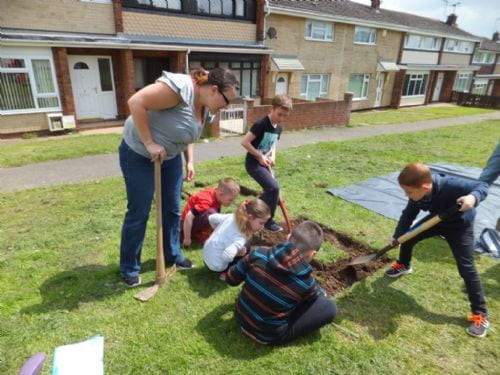European research supporting rural well-being through community archaeology
7 February 2019
A project aimed at boosting well-being in rural communities will involve thousands of members of the public in excavating archaeological finds under lawns and flowerbeds across Europe. The Community Archaeological in Rural Environments – Meeting Social Challenges (CARE MSoC) initiative involves archaeologists and psychologists in exploring how making new discoveries about their local archaeology can […]

A project aimed at boosting well-being in rural communities will involve thousands of members of the public in excavating archaeological finds under lawns and flowerbeds across Europe.
The Community Archaeological in Rural Environments – Meeting Social Challenges (CARE MSoC) initiative involves archaeologists and psychologists in exploring how making new discoveries about their local archaeology can help rural communities meet the challenges of the 21st century.
Over the next three years, thousands of rural residents across the Czech Republic, Netherlands and Poland will dig hundreds of one-metre square ‘test pits’ within participating villages and analyse their findings with archaeologists.
Along with new revelations about villages’ long-term histories, similar projects in the UK have generated wider social impacts, improving social mobility, strengthening social cohesion, enriching lives and increasing opportunities for fulfilling locally-based voluntary activity. CARE MSoC will investigate how these wider benefits of participating in local archaeology projects can be achieved in European countries beyond the UK.
CARE MSoC is an initiative led by Professor Carenza Lewis from the University of Lincoln, UK, and funded by four national research councils through the European Commission. The overarching aim is to help the heritage sector to improve life in rural communities. As well as exploring how existing approaches need to be adapted for different countries, the research will develop new toolkits to facilitate future work.
The international project encompasses varied landscapes in terms of culture, history and rurality. Across these, all the test pits will be the same size and follow the same methodology, meaning they offer the same opportunities to different people while sourcing valuable data that can be directly compared.
CARE MSoC builds on similar participative public archaeology projects led by Professor Lewis in eastern England, in which local volunteers uncovered new finds revealing the impact of the Black Death while also developing new skills, knowledge, interests, connections, confidence and aspirations for the future.
The impact of the CARE MSoC excavations on individuals and communities in Europe will be analysed at local, national and international levels. The results will be disseminated to heritage policy-makers and practitioners by project partners including the European Archaeological Council, the Cultural Heritage Agency of The Netherlands and the UK’s National Trust, helping shape and build future community archaeology projects both in the UK and internationally.
Carenza Lewis, project lead and Professor for Public Understanding of Research at the University of Lincoln, said: “I am really excited about this project because I have seen the positive impact of community test pit projects in the UK, so I am very pleased we will now be able to extend this elsewhere in Europe.
“By improving the capacity for participative public archaeology projects in rural communities to instil new skills, raise aspirations, enhance self-esteem, and extend social networks while making new discoveries about communities’ shared histories, I hope that the outcomes of this project will enrich lives and support well-being in rural communities across Europe for years to come.”
Dr Ingrid Samuel, Historic Environment Director for the National Trust, said: “The National Trust exists to connect people with the past, by sharing our extraordinary places and increasingly through supporting local communities to explore their own history. We are excited to engage with this important research project, which will bring people together and strengthen our understanding of the benefits that active public participation with heritage brings to rural communities.”
The international project includes archaeological experts from across Europe including Professor Heleen van Londen at the University of Amsterdam, Netherlands, Professor Dr Pavel Vaøeka at the University of West Bohemia, Czech Republic, and Professor Arkadiusz Marciniak at the Fundacja Dziedzictwo and the
Adam Mickiewicz University
in Poznañ, Poland.
To assess the wellbeing impacts on individuals and communities Dr Anna Rabinovich at the University of Exeter is leading the psychology stream and Dr Stuart Dunn at King’s College London will lead on the digital humanities.
Dr Anna Rabinovich at the University of Exeter: “This project opens up a crucial opportunity to understand why test pit excavations result in such positive outcomes for participating communities. By uncovering psychological processes underlying this approach, we will be able to enhance its effectiveness further, as well as adapt it to different communities’ needs”.
More information can be found here:
https://archaeologyeurope.blogs.lincoln.ac.uk
